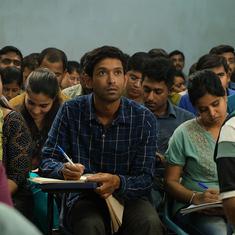Rush Hour: India blocks Bangladesh transshipments, West Bengal CM says no Waqf Act in state and more
Become a ‘Scroll’ Member to get Rush Hour – a wrap of the day’s important stories delivered straight to your inbox every evening.

Rigged rankings, fake assessments – is your degree at risk? Fund our special project: India’s Great Education Betrayal
India has withdrawn a four-year-old facility that allowed Bangladeshi export cargo to be transshipped through Indian land customs stations to third countries. The decision, announced by the Central Board of Indirect Taxes and Customs on Tuesday, follows complaints about reduced cargo space, congestion and rising air freight costs from Indian exporters.
Industry bodies like the Apparel Export Promotion Council had lobbied for the move. The suspension could disrupt Bangladeshi logistics and may raise questions over India’s World Trade Organization obligations, which require smooth transit for landlocked countries.
The development also comes amid diplomatic tensions, triggered by Bangladesh Chief Adviser Muhammad Yunus’ comments in China about Dhaka being the “only guardian of the ocean” for India’s landlocked North East states, a claim that drew sharp political backlash in Delhi. Read on.
China will impose 84% tariffs on United States goods starting Thursday, sharply raising duties from the previously announced 34% in retaliation for escalating American trade measures. The move follows US President Donald Trump’s decision to slap 104% total tariffs on Chinese imports, up from an initial 34%, after Beijing imposed its own counter duties.
China’s foreign ministry accused Washington of “bullying practices” and warned it would “fight to the end” if tensions continue. Trump’s broader tariff plan, which took effect this week, includes a 10% minimum tariff on most imports, a 25% duty on foreign-made cars and a 26% levy on Indian goods.
A day after the tariff plan was announced, New York-based financial services firm JPMorgan revised its odds for a global recession by the end of 2025 from 40% to 60%. Financial services firm Goldman Sachs has raised the probability of a recession in the US to 45% in the next 12 months. Read on.
In Donald Trump’s tariff game, everyone is a loser – including US online shoppers
West Bengal Chief Minister Mamata Banerjee has said her government will not implement the Waqf Amendment Act in the state, asserting that she will protect minority communities and their properties. Speaking at a Jain community event in Kolkata, the Trinamool Congress leader criticised the Centre’s move, saying the law aimed to divide society.
The amended Act curtails the powers of waqf boards, allows non-Muslims as members, restricts property donations and alters waqf tribunal procedures. Banerjee cited recent violence in Murshidabad and Bengal’s large minority population to question the timing of the legislation.
Several parties, including the Congress and the All India Majlis-e-Ittehadul Muslimeen, have challenged the Act’s constitutionality in the Supreme Court. Read on.
The Maharashtra government has told the Bombay High Court that it has not taken any vindictive action against people who shared video clips or sang songs from comedian Kunal Kamra’s recent performance.
The statement was made in response to a petition by a law student seeking protection for Kamra’s freedom of speech and that of his audience. The court disposed of the plea, saying Kamra is already pursuing legal remedies and does not need representation by a third party.
Kamra’s video, uploaded on March 23, included satirical criticism of Deputy Chief Minister Eknath Shinde. It sparked a backlash from Shinde’s supporters, who vandalised the recording studio. While 12 were arrested and later released on bail, Kamra has been booked for defamation and public mischief. He has skipped three police summons so far. Read on.
How the attacks on Kunal Kamra undermine the freedoms of all Indians
If you haven’t already, sign up for our Daily Brief newsletter.









